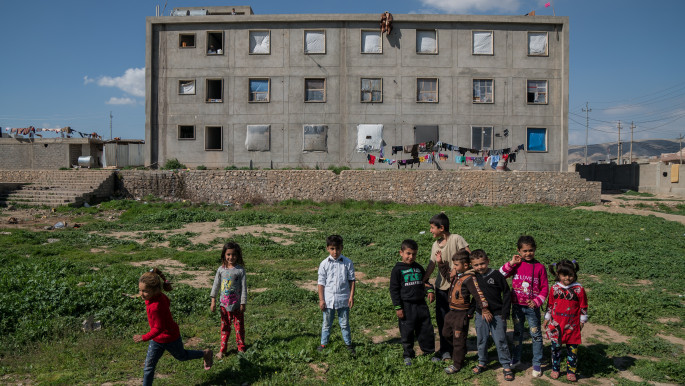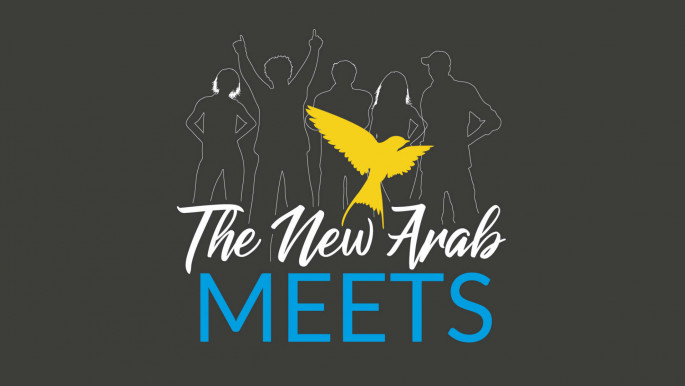'Their wounds must be acknowledged': What does the future hold for Yazidis who survived IS?
Earlier this week, Nobel peace prize winner Nadia Murad met US Vice President Mike Pence to discuss the security situation for Iraq's religious minorities.
In her moving speech at the UN General Assembly in March 2017, the young woman, who was abducted by Islamic State [IS] militants in 2014 from her hometown in Iraq, had bravely shared her horrific experience with the world, becoming a symbol and spokesperson for the Yazidi people.
The gripping question now is: what is the future for those who have survived IS?
While IS has been militarily defeated in Iraq and no longer occupies the area of Shingal, where the Yazidi community lived, roughly 350,000 Yazidis now continue to live in refugee camps.
Over 3,000 people were reported to be slaughtered by IS, over 6,000 kidnapped and an unknown number of women remain unaccounted for even today in Syria. Some are still held in captivity but no one knows how many are still alive. There are 45 mass graves in the area that have not been excavated yet. Most of them lived in Shingal in a primarily farming setting.
IS contaminated the zone, especially south of Shingal; it also became a conflict area between political parties. This explains why only around 65,000 people have returned, as they experienced extremely dire conditions: no medicines, destroyed homes, lack of aid and security. International aid has reached Iraq but not in this area, Nadia Murad stated.
A process had been launched to begin to collect the evidence and testimonies required to compile the needed documentation to officially classify it as genocide.
The Yazidi are no strangers to experiencing mass killing. Under Ottoman rule, the Yazidis were victim to 72 genocidal massacres . They have been considered infidels by different groups even before IS, according to some sources largely due to their worship of a 'fallen angel' or Peacock angel, which earned them the misleading reputation for being devil-worshippers.
The UN formally recognised it as genocide in June 2016, describing the situation as "ongoing" with a high number of Yazidi still missing. The lack of formal research on the death toll appears to be one the reasons holding back international action.
 |
|
The New Arab met with Bushra* and Badiha*, two young sisters who were abducted by IS, and now live in the Khanke refugee camp in Iraq's Dohuk, to learn about their hopes and aspirations for the future.
Trapped in a camp life with no prospects and little psycho-social support, no schooling or jobs, while they survived IS the question seems to be: what next for the rest of their young lives?
The failure of the international community to act at this point may be equally responsible for shaping their lives now, unless significant measures are put in place.
"I was 11-years-old when my life was torn to pieces," Bushra tells The New Arab.
"I was sold to an 'emir' in Mosul. I did not think I would survive much longer when I decided to try to escape. I was 'fortunate' when I managed to make it out of the home. A peasant from Mosul found me in the fields and he hid me with his family for almost a year, until the city was liberated from IS."
As frequently documented by other IS Yazidi victims, many girls who escaped and asked for help ended up being returned to their captors and brutally punished for their escape.
"When IS came to my village and kidnapped us I was 12. I will never forget what they did to us," says Badiha.
"I was sold many times and I ended up in [the Syrian city of] Raqqa. I was freed only when the city was liberated from IS. I remember being always afraid, I never thought I would ever be reunited with my family."
 |
When IS came to my village and kidnapped us I was 12. I will never forget what they did to us |  |
When asked if they would ever want to return to their original home, Bushra responded, "Never, never, never. I never want to go back. All that happened there, in my house, in my village, I can never forget it. I do not want to see it again."
Bushra is now 15 and while her face is that of a teenager, the expression of grief and sadness are present in every feature and movement.
"I would like to leave this camp one day and go to Europe or the US, to leave. There is nothing for us to do here in the camps. My sister and I, like everyone else here, just sit here waiting."
Badiha on the other hand is more hesitant.
"I don't know if I want to go back, maybe some day. Here we do not go to school, our days are so different from when we had our lives before IS. We live in these tents and not in our home. I don't want to leave my country. But I will never forget."
 |
|
| Many Yazidis now live in tents at the refugee Camp in Dohuk, Iraq [Getty] |
 |
|
|
Displaced Yazidi children play in a playground of a school that was never completed. |
The New Arab also spoke to post-doc researcher Barzan Barzani, at McGill University, to discuss the legal implications of the establishment of a Truth Commission versus the International Criminal Court and whether the Yazidi community wants it.
"I work with international lawyer and professor Paym Akhavan at McGill University in Montreal, who was a member of the Permanent Court of Arbitration in the Hague. In 2016 he was asked by the Kurdistan Regional Government (KRG) to help establish a Truth Commission to help investigate and document the crimes committed by IS," Barzan Barzani tells The New Arab.
"My contribution was to co-author the survey which was distributed to the Yazidis to learn what they expected from the international community in terms of ensuring their future legal protection."
The survey was comprised of 22 questions, distributed to 700 Yazidis, as well as other minority groups who suffered in Iraq under IS. David Matyas from Oxford also worked with Barzani and his team to help analyse the data.
 |
Victims cannot be forgotten, their wounds need to be acknowledged first, only this way will a healing process be possible |  |
"We wanted to know from them what they wanted. However, drafting a set a questions proved to be a complex process. The Yazidi community are mostly comprised of farmers, so the overall education level is low. We needed to ensure the concepts were clear and understood," Barzani said.
"It struck me how often the concept of 'how do you feel about this' went unanswered. People struggled with this idea, not due to language barriers, all the surveys where distributed in their specific dialect, but with the idea itself.
Talking about the different implications for the Yazidis from a legal perspective of having their case taken before the International Criminal Court vs. the establishment of a Truth Commission, Barzani said, "It is two-fold. Iraq is not a state party to the International Criminal Court. Furthermore, it is a question of the time needed for due process. It will take at least two or three years to conduct its investigations and issue arrest warrants. By then, the chance these IS members would be captured is dim.
"On the other hand, as we see today, the victims cannot be forgotten, their wounds need to be acknowledged first, only this way will a healing process be possible. By establishing a historic record, offering the community with a type of 'collective therapy', people who have suffered such inhuman conditions and referred to as devil-worshippers will be given a way to heal. Human rights are one of the most powerful antidotes to violence by the factions that are ripping the region apart."
Barzani added that a Truth Commission is not binding legally in its findings and is usually effective only when it includes compensation for the victims.
But, "one of the positive effects of having the International Criminal Court try the cases, if found guilty, is that it will have long-term effects."
Barzani explains that the Yazidi community has four main demands. They want the women and children still held captive to be rescued; they ask that the tragic events be recognised internationally as genocide and reparation for what happened to them and they ask the international community to protect them.
"They have lost faith in both the Iraqi government and KRG to protect them which is why they predominantly ask for an international court system," he says.
Bushra and Badiha, like most of the Yazidi girls taken by IS, and currently held in refugee camps. They have many difficulties expressing their feelings as eloquently as Nadia Murad – their trauma is ongoing while their future remains grim and uncertain under those tents. This limbo has resulted in some girls committing suicide in the camps.
While nothing can erase their past, their future can still be shaped by what the world decides to do for the Yazidi people today.
*The sisters' last name is omitted to protect their identity and privacy. The sisters speak the Kermanji dialect, the interview was conducted with the aid of an interpreter and in the presence of their remaining family members, in their tent. To shield the girls from further trauma, detailed questions about the horrors they suffered were not asked. They expressed relief when this was explained to them before being interviewed.






 Follow the Middle East's top stories in English at The New Arab on Google News
Follow the Middle East's top stories in English at The New Arab on Google News


